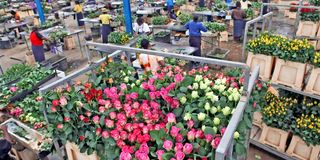Horticulture exporters look forward to better prospects as countries open up

Workers prepare roses for export to the European markets at the Maridadi Flowers warehouse in Naivasha, in this past photo. The country's horticulture industry is optimistic of quick recovery as countries open up after the Covid-19 pandemic disruption.
What you need to know:
- Export earnings hit Sh72 billion between January and May, up fromSh65 billion for the same period last year, translating to an 11 per cent increase.
- The good earnings are largely attributed to the country’s ability to ship out produce during the pandemic, cashing in on rising demand for food.
- Oserian Development Company administration director Mary Kinyua said the farm exports fell from a million stems per day to about 350,000 throwing the company, like many others, into a financial strain.
- The Avocado Society of Kenya CEO Ernest Muthomi said at the start of the restrictions, they had to negotiate for clearance of vehicles with the police officers.
The horticulture industry in Kenya is optimistic of quick recovery as countries open up after the Covid-19 disruption.
Export earnings hit Sh72 billion between January and May, up fromSh65 billion for the same period last year, translating to an 11 per cent increase.
The good earnings are largely attributed to the country’s ability to ship out produce during the pandemic, cashing in on rising demand for food.
“The export sector did Kenya proud,” said Trade Cabinet secretary Betty Maina during the Kenya Export Strategy 2020 Webinar organised by the Kenya Export Promotion and Branding Agency (Keproba), this week.
“We expected the worst but our earnings are up, an indication of Kenya’s potential to protect its markets by ensuring products reached them in a challenging environment.”
Keproba CEO Wilfred Marube said the sector brought out the best of the country’s resilience at beating the odds to keep the ‘produce of Kenya’ label in the global shelves, a sacrifice that has not only secured existing markets but also created new avenues for the country’s flowers, fruits, herbs and vegetables.
“It was a tough call for exporters, especially in the flower sector, who had to balance between maintaining a market presence, destroying beautiful flowers, sending workers home, keeping plants breathing and protecting their farms from the virus,” he said.
Market presence meant selling flowers, not to make money but to maintain a presence for Kenya, according to Trish Patel, head of marketing at PJ Dave, whose 80 per cent of orders were cancelled.
“We continued shipping the little orders coming through to secure future markets for Kenya”, he said.
Oserian Development Company administration director Mary Kinyua said the farm exports fell from a million stems per day to about 350,000 throwing the company, like many others, into a financial strain.
“The markets are opening up slowly and barring any other disruptions, we should be back to full business by end of the year,” she said, adding that it will, however, take longer to recover from the losses.
Grappling with cancellation of orders
“March 15 is a day I will not forget in my life”, said Craig Oulton, general manager, floriculture at Kisima Farm, which is based in Timau.
On the day, President Uhuru Kenyatta restricted movement in and out of Nairobi, the distribution centre for fresh produce exports.
The following week, international flights were grounded and for a week no produce was shipped out of the country.
Nairobi hosts the Jomo Kenyatta International Airport through which fresh produce flies out daily to the various destinations across the world.
The lockdown came as the industry was grappling with cancellation of orders at a critical season (March-May) covering Mothers Day, International Womens Day, UK Mother’s Day and the Easter holidays.
“The coordination of the movement of produce from farms to the airport in a pandemic challenge remains a proud moment for Kenya,” said Dr Marube.
The Avocado Society of Kenya CEO Ernest Muthomi said at the start of the restrictions, they had to negotiate for clearance of vehicles with the police officers.
“Our efforts earned Kenya avocados, the highest foreign exchange for the period ever and has opened new markets and demand even in countries where Kenya doesn’t have phytosanitary protocols,” he said.
Fresh Produce Exporters Association of Kenya CEO Hoseah Machuki said the sector was grateful to the government for listening to the industry and clearing logistical challenges to enable our products get to the markets.





